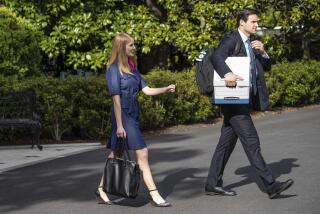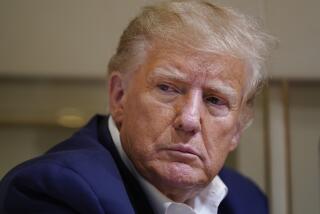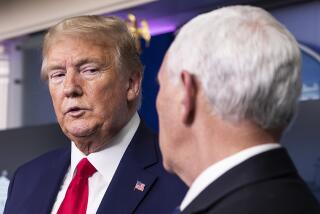Poindexter Says Deaver Sought His Help in Arranging Meeting
- Share via
WASHINGTON — Former National Security Adviser John M. Poindexter testified Friday that Michael K. Deaver asked him to help arrange a brief meeting between a Korean official and President Reagan in 1985 but that he found “nothing unusual” in the request.
Deaver, who is on trial on perjury charges, had left his job as deputy White House chief of staff to establish a public relations firm and was representing the South Korean government at the time the call was made.
Poindexter, appearing at the end of the first week of testimony, said he did not know that Deaver had signed a contract to lobby for the Seoul government when he telephoned.
Short Conversation
Poindexter said the conversation, which took place when he was deputy national security adviser, was “very short, less than five minutes.” It occurred “sometime in the fall of 1985,” he said.
Deaver “indicated that the Korean ambassador had a letter to deliver to the President,” Poindexter testified, adding that Deaver “wondered if it were possible to get him on the schedule to deliver the letter” to Reagan.
Poindexter, a major figure in the Iranian arms-for-hostages scandal, said that he contacted Gaston Sigur, another National Security Council aide, and that Sigur said there was “already a request working and he would follow up on it.”
He said he did not remember if the letter was delivered. “I . . . didn’t participate in meetings like that,” said Poindexter, who testified for 20 minutes, his arms folded much of the time and his trademark pipe missing.
Letter Delivered
The letter from President Chun Doo Hwan was about trade issues and was delivered to Reagan by Kim Ki Hwan, a South Korean businessman and a trade adviser to the South Korean government.
Federal ethics law prohibits former high-ranking officials, such as Deaver, from contacting their former government colleagues on behalf of a business client for a year after they leave federal service. Deaver left the government in May, 1985, just months before the call to Poindexter.
Under cross-examination by chief defense attorney Herbert J. Miller Jr., Poindexter asserted that Deaver tried neither to coerce nor influence him. “We used to get frequent requests for those sort of meetings,” Poindexter testified, adding that they were “generally granted . . . especially if it was a friendly country like Korea, which is an ally of ours.”
Deaver is charged with perjuring himself on five occasions last year in testimony before a congressional subcommittee and a federal grand jury investigating his lobbying activities.
‘Some Mistakes’
Miller has said that erroneous statements by Deaver were not intentional, that because he had answered 1,050 questions during more than 10 hours before the House panel and grand jury, he was likely to make “some mistakes.”
Also, Deaver’s defense lawyers have asserted that he has a drinking problem so serious that it impaired his memory.
Poindexter’s appearance Friday interrupted the second day of testimony by Pamela G. Bailey, an associate of Deaver at his lobbying firm.
The prosecution witness said Deaver worked for weeks preparing to testify about his lobbying. In getting her to recount the preparations, prosecutors were trying to refute defense contentions that Deaver could not recall lobbying former colleagues in the Administration.
During cross-examination, the defense elicited from Bailey voluminous details on how government agencies are lobbied routinely by private agencies and individuals. Bailey will return to the stand when the trial resumes Tuesday.
More to Read
Sign up for Essential California
The most important California stories and recommendations in your inbox every morning.
You may occasionally receive promotional content from the Los Angeles Times.












